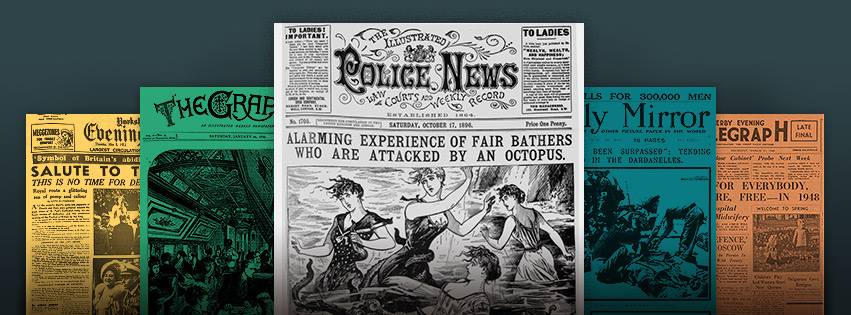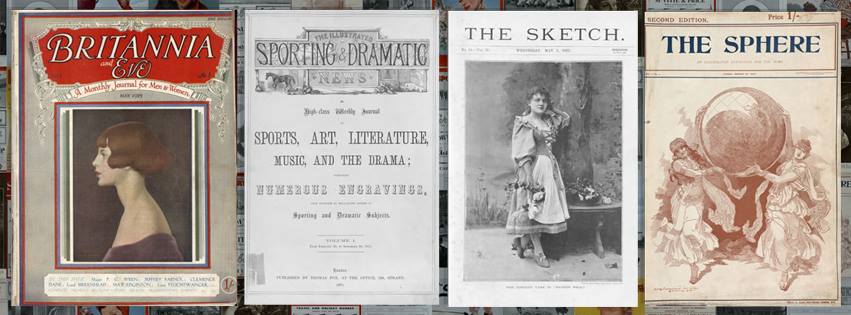23 January 2017
|
Discover how historical newspapers can help you find fascinating facts about the life and times of your ancestors, with expert tips from the British Newspaper Archive.
Discover how historical newspapers can help you find fascinating facts about the life and times of your ancestors, with expert tips from the British Newspaper Archive.
The newspapers available on the British Newspaper Archive may be the key to unlocking your family’s history.
Contained within their pages are tens of millions of reports, advertisements and notices that can help you break down brick walls, and tell richer stories about your ancestors.
Join the Family Tree community
Follow us on facebook
Follow us on twitter
Sign up for our free e-newsletter
Discover Family Tree magazine
The British Newspaper Archive has digitised millions of pages of newspapers from the UK and Ireland and over 100,000 are added every week. The collection spans three centuries from 1708 to 2003.
The late nineteenth century was the heyday of the newspaper and local papers flourished. But these historical newspapers differ from modern newspapers in a few ways, and it is helpful to understand these differences as you begin searching.
HISTORIC NEWSPAPER SEARCH TIPS
 Historic newspapers were often only 4 pages long and carried advertisements and notices on the front page rather than a ‘cover story’. While you will find some beautiful engravings particularly as part of advertisements, there were few photographs until after 1910.
Historic newspapers were often only 4 pages long and carried advertisements and notices on the front page rather than a ‘cover story’. While you will find some beautiful engravings particularly as part of advertisements, there were few photographs until after 1910.
The expense of producing the newspaper meant that the text is often densely packed to make the most of the available space, there are few headlines and each story is followed closely by the next. Newspapers were the main source for all news and entertainment and they often published stories and poetry.
Here are a few tips for getting the most out of historical newspapers:
- Don’t restrict yourself to your local paper: Newspapers printed stories from all over the country; it is not unusual to find a story from Scotland published in a local paper from Devon
- Use surnames to search: In the 19th century first names were not always published. Your ancestor could be known as Mr. Smith, or ‘a young lady called Smith’
- Language: Some of the language used can be unfamiliar and the names by which we know a historical event might not be the name used to describe it when it happened. For example, World War One was the Great War
- Optical Character Recognition: Newspapers are made searchable using OCR; fuzzy or blurred print can make it difficult for the computer to translate the text. Keep this in mind when searching. Luckily several newspapers will often report on the same event
What will you find?
- Birth, marriage & death notices: These appear regularly after 1820 and also include announcements about family members who have moved abroad
- Civil & army promotions: If your ancestor was in the civil service or military services, their promotions and movements can be followed in the newspapers
- Advertisements: Early advertisements relied on words rather than images to get their message across and these story-like advertisements can give you great insight into your ancestor’s business dealings
- Debtors: The names and addresses of borrowers and money-lenders were printed in newspapers
- Court reports: These feature regularly in newspapers and contain the names of defendants, victims and witnesses. Court reports often give physical descriptions of defendants, and report testimonies, allowing you to ‘hear’ your ancestor’s voice
- Charitable donations and subscription lists: You will find long lists of names in the newspapers acknowledging contributions to charity and group membership
- Public meetings: The minutes of public meetings are reported in newspapers and usually name the committee members
- News! News stories big and small, local, regional, national and international were reported in the papers
Speciality titles
The Archive has a number of speciality titles which are particularly suited to family history research.
- Sports newspapers such as the Sporting Times are excellent for tracing athletic ancestors
- If your ancestors trod the boards search for reviews in The Stage and The Era
- For those with seafaring ancestors Lloyd’s List is an essential resource. This newspaper reported on the movement of ships whose home ports were in the UK and Ireland
- Dedicated Crime titles are filled with notices of suspicious persons and rewards for the return of stolen goods. The Illustrated Police News also gives lurid accounts of infamous crimes
- The Poor Law Union Gazette is a rich resource for family historians, particularly for those where families were broken up by poverty. The paper publishes notices of men and women who absconded from their families, including names and physical descriptions
 Be advised, private details are made public. Historical newspapers print details that would not be included in modern newspaper reports. The details of events can be quite graphic. Incidents such as suicides were reported with full details such as the name of the person and the circumstances of their death.
Be advised, private details are made public. Historical newspapers print details that would not be included in modern newspaper reports. The details of events can be quite graphic. Incidents such as suicides were reported with full details such as the name of the person and the circumstances of their death.
You might be surprised by the stories you uncover as one user got in touch to tell us: “I've just bought a subscription to The British Newspaper Archive and found some cracking stuff about my granddad. He played the piano on a cruise for the Prince of Wales and Prince George in 1931!”
Others have found sketches and even photos of long-lost ancestors. You can explore over three centuries of history by searching the British Newspaper Archive – millions of stories are waiting for you.







